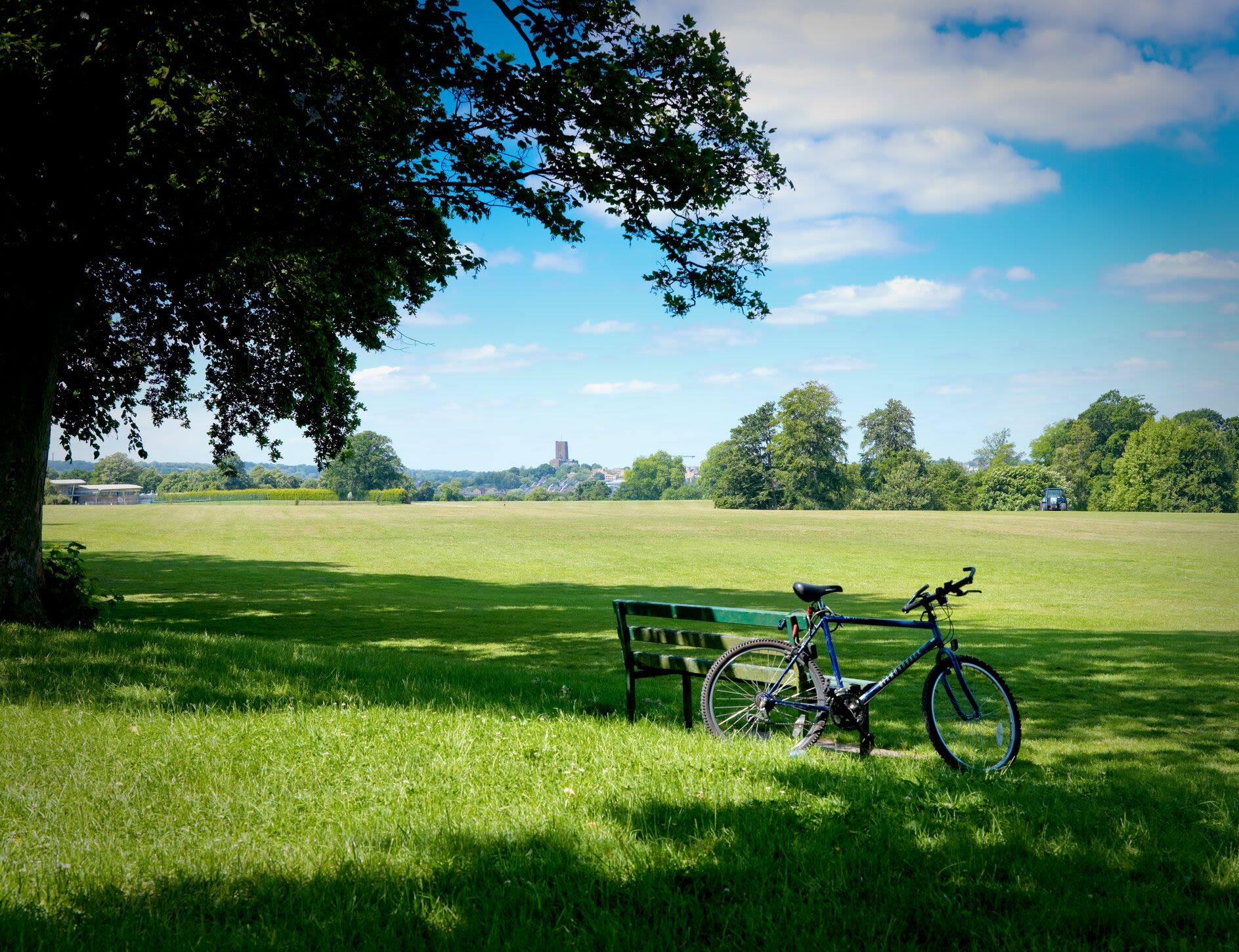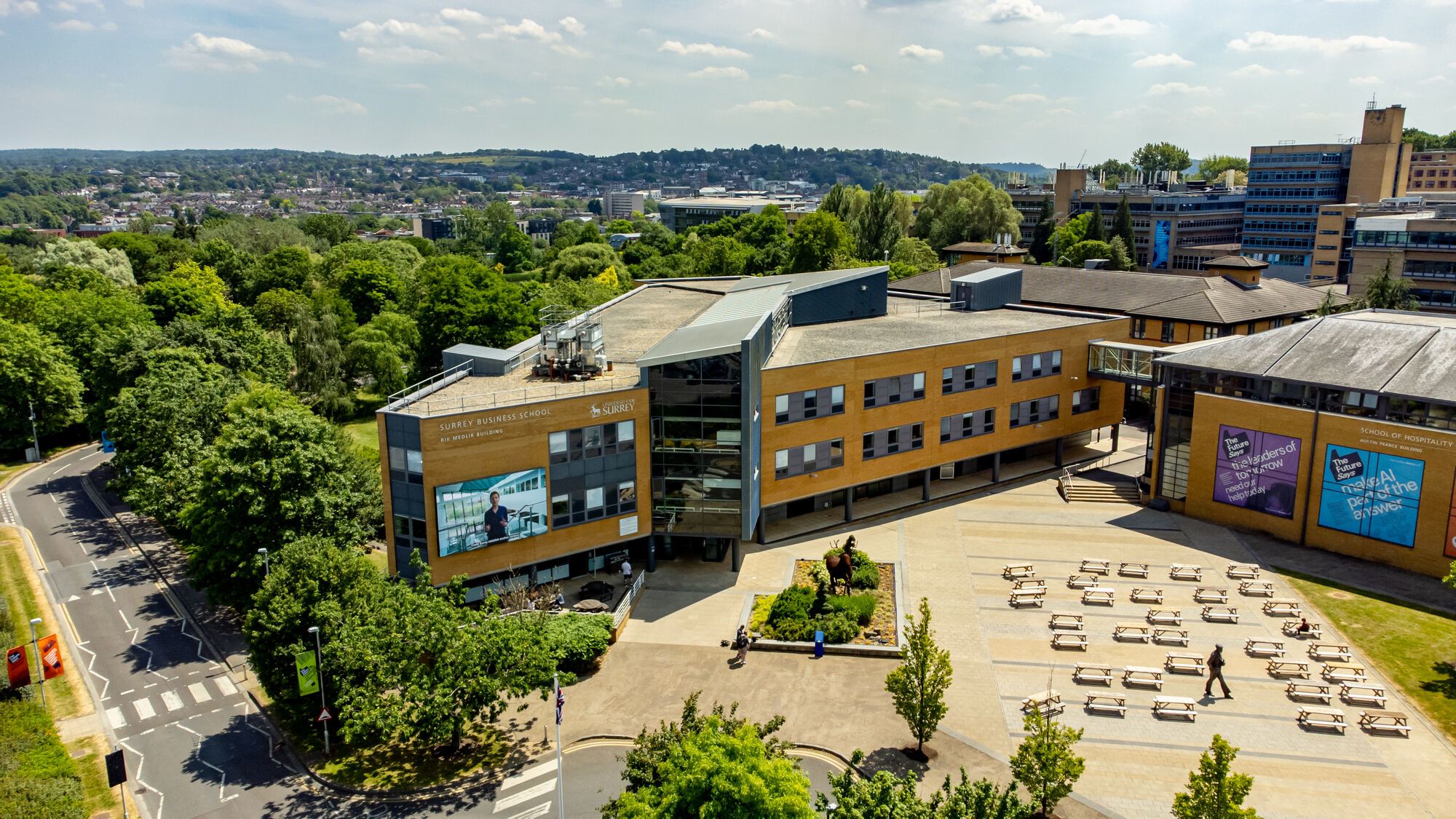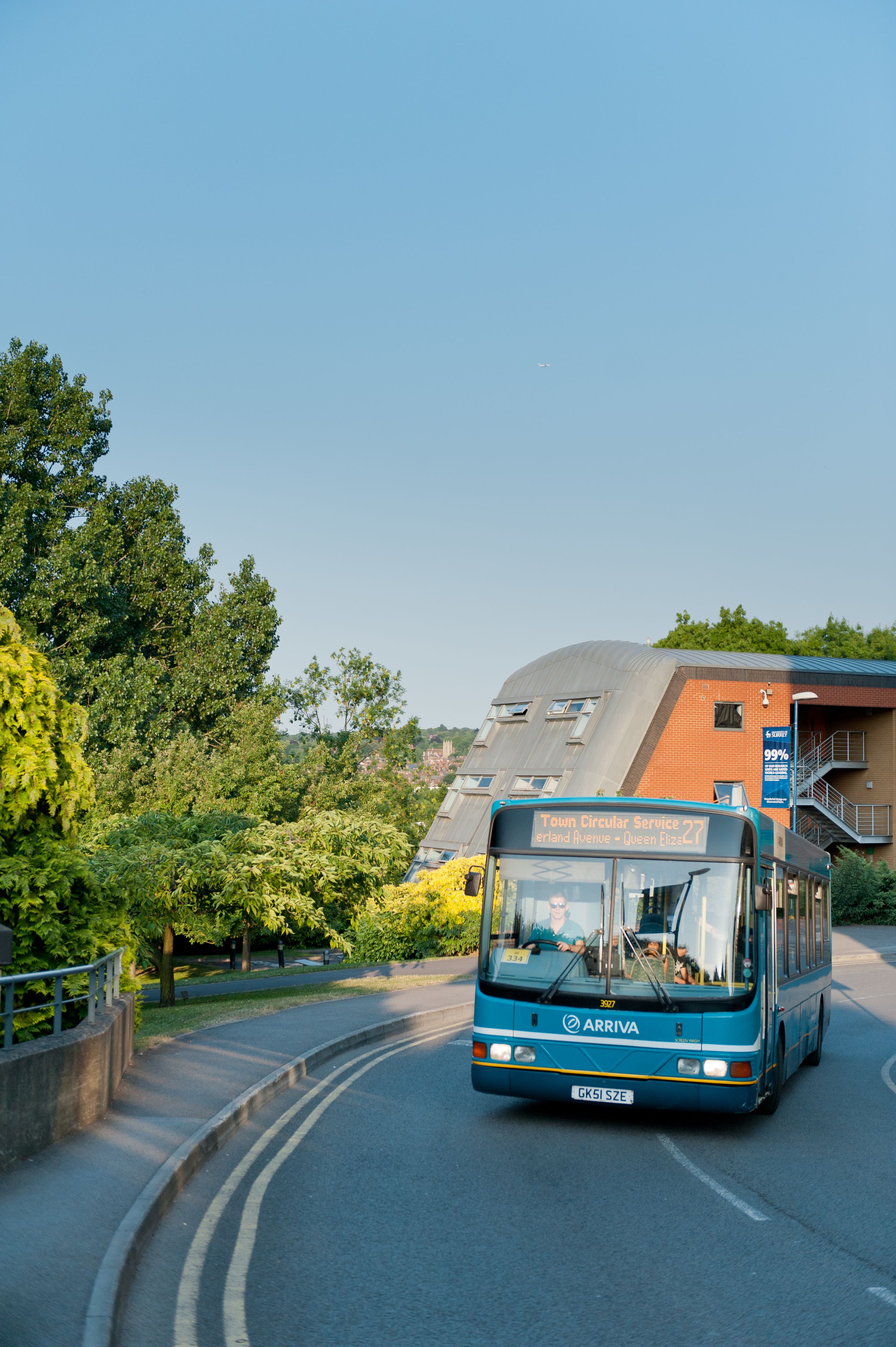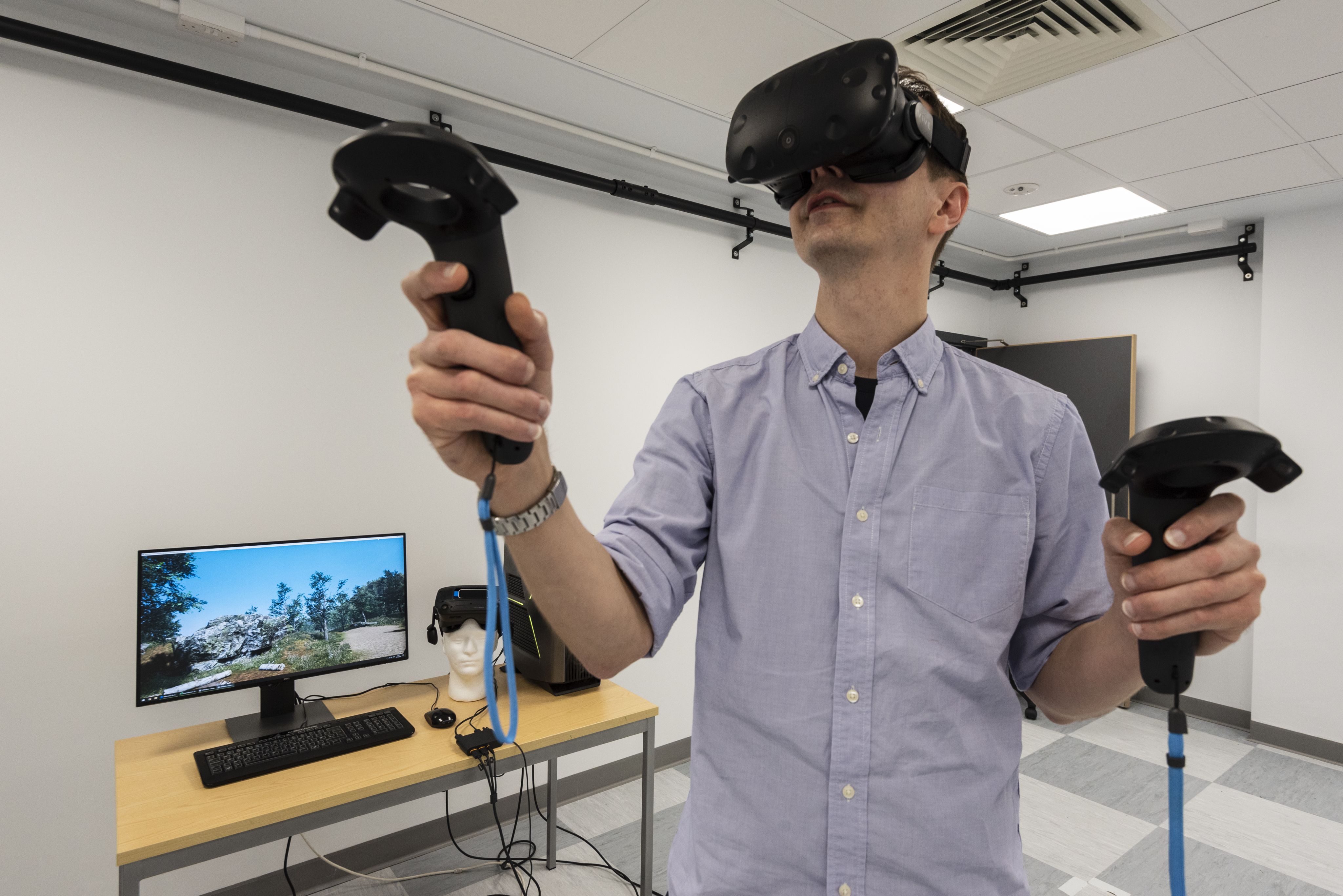
Welcome from the Conference Chairs
Eleanor Ratcliffe and Birgitta Gatersleben
We are delighted to welcome you to the 29th International Association for People-Environment Studies (IAPS) Conference, which will take place from Monday 29 June to Friday 3 July 2026 at the University of Surrey, Guildford, United Kingdom.
The theme of IAPS 2026 is Sustainability as Wellbeing: Towards healthy, green, and equitable communities. Transition towards sustainable lifestyles requires innovative, just, and holistic actions.
At this conference, we turn the spotlight on the deep connections between the health of people, communities, and societies, and the health of the planet and its ecosystems, in pursuit of inclusive and equitable solutions to society’s most pressing challenges.
Why attend IAPS?
IAPS conferences happen every two years and are major international, interdisciplinary meeting places for people-environment researchers. This is a key opportunity to share cutting-edge research on transactions between people and their physical surroundings, and gain new knowledge about theories, evidence, applications, and methods in this area. We are honoured to be joined by internationally recognised keynote speakers, individually and in a discussion panel format.
Beyond the sharing of knowledge, one of the great strengths of IAPS is its ability to bring people together – for example, in our Early Career Researcher Workshop, during the scientific programme, and in conversations over coffee or dinner. Chance meetings at these conferences often become valued friendships and collaborations. Whether this is your first time at IAPS or your twentieth, we hope that you will find your community with us in 2026.
We are embedding our Guiding Principles of environmental sustainability, knowledge co-production, and equity, diversity and inclusion into the planning and delivery of IAPS 2026. As a result we hope that you will find this a supportive, inclusive, and accessible event that strives to balance environmental, social, and economic sustainability.

Get to know Surrey
The University of Surrey was established in 1966. It has an enrolment of over 15,000 students, makes a £1.8 billion contribution to the UK economy, and is a leading university in terms of sustainability, student satisfaction, and graduate employability.
IAPS 2026 will be held on our green, biodiverse Stag Hill campus in Guildford, approximately a 30-minute train journey from London.
We hope that you will enjoy this opportunity to visit Guildford and the nearby Surrey Hills National Landscape, a protected area of natural beauty known for its trails, woodlands, and grasslands. You can explore the campus and some of our local attractions using the links below. We will add to these resources as we continue to develop the website.
- Campus map (PDF)
- Take a virtual tour of our campus
- Our Guildford location: Highlights and take a video tour of the town centre
- Visit Surrey: What’s on in Guildford

About us
IAPS 2026 is hosted by the School of Psychology at the University of Surrey. The School is home to over 50 research-active staff and a large cohort of PhD and Clinical Doctoral students, working with a range of partners to produce psychological research with significant positive effects on society.
People-environment studies at Surrey
Surrey’s Environmental Psychology Research Group (EPRG) is renowned internationally for its expertise and long tradition in people-environment studies. The EPRG established the world’s first MSc in Environmental Psychology in 1973 and has taken a leading role in developing the Environmental Psychology Section of the British Psychological Society. Surrey students and alumni lead the active, ECR-focused British Environmental Psychology Society (BrEPS), and several of our staff and alumni are involved in IAPS as current or former Board members. University of Surrey co-leads major research and knowledge exchange programmes such as the Centre for the Understanding of Sustainable Prosperity (CUSP) and Advancing Capacity for Climate and Environment Social Science (ACCESS).
APS 2026 is also supported by Surrey’s pan-University Institute for Sustainability (IfS), which harnesses the power of collaboration across all disciplines (within and beyond Surrey) to drive the transition to a sustainable world of long-term wellbeing for all. The IfS is a synthesis platform, holistically bringing together education and research for action via systems thinking and disruptive innovation. The IfS partners with real-world champions in the public, private and third sectors to showcase how change can happen, and commits to achieving its purpose in a way that protects and enhances the health of social and environmental systems.
Local Organising Committee
The organisation for IAPS 2026 is divided into committees, led by Eleanor Ratcliffe (Conference Co-Chair, and Chair of the Operations & Delivery and Communications & Engagement committees), Birgitta Gatersleben (Conference Co-Chair, and Chair of the Scientific Committee), Sarah Payne (ECR Workshop Chair), and Anna Bornioli (Guiding Principles Chair). We are grateful for the assistance of the colleagues below, within and outside of Surrey, who participate in these committees.
|
From University of Surrey Eleanor Ratcliffe1, 2, 3 Birgitta Gatersleben1, 2, 4 Tom Roberts1, 2, 5 Sarah Payne1, 5 Melissa Marselle 2, 3 Sarah Golding1, 4 Trevor Hood1, 3 Kirstie Hatcher1, 3 Susie Thompson1 Tamala Anderson3, 4 Michael Hassell4 Matteo Giusti2 |
From external organisations Sadhana Jagannath, Imperial College London2, 3, 4, 5 Anna Bornioli, ISGlobal1, 2, 4, 5 Daniel Iacofano, MIG, Inc 2, 3 Charles Musselwhite, Aberystwyth University2, 3 Hebba Haddad, University of East London2, 4 Kayleigh Wyles, University of Plymouth2 Ian Walker, Swansea University2 Chris Jones, University of Portsmouth2 Clara Weber, Zurich University of Applied Sciences2, 5 |
1 Operations & Delivery Committee, 2 Scientific Committee, 3 Communications & Engagement Committee, 4 Guiding Principles Committee, 5 Early Career Researchers Workshop Committee and Mentors
Our Scientific Committee will be supported by valued peer reviewers, whose names will be listed here closer to the conference.
Keynote speakers
Professor Jenny Roe
Emeritus Professor in the Department of Urban & Environmental Planning, University of Virginia
Jenny is also a Visiting Professor at Edinburgh College of Art, University of Edinburgh, Honorary Professor at The Research Centre for Urban Studies (RCUS), Heriot Watt University, UK.
An environmental psychologist and former head of Landscape Architecture for an international architectural practice, Professor Jenny Roe writes, lectures, and consults for a wide range of academic and public audiences on human health-centered design for the built environment. She is an expert in restorative environments that support mental health including an important role for public parks and urban green space. Her book on this subject, Restorative Cities: Urban Design for Mental Health and Wellbeing (Roe and McCay, 2021) explores a new way of designing cities that puts mental health at the forefront. A companion book under development will set out an evidence-based approach for designing interiors for mental health, Restorative Architecture, the Science of Design for Mental Health and Wellbeing (Bloomsbury, 2027).
Professor Marketta Kyttä
Professor in Land Use Planning, Aalto University, Finland
Professor Marketta Kyttä has her background in environmental psychology and participatory planning. Her research covers various topics: child- and human-friendly environments; environments that promote wellbeing and health; urban lifestyles; perceived safety; and new methods for public participation. Currently, her multidisciplinary research team concentrates on place-based person—environment research with public participation GIS methodology. The team has worked on numerous real-life public participation projects in cities in Finland. Professor Kyttä’s work aims to integrate the fields of land use and transportation planning without forgetting the human focus.
Dr Charles Ogunbode
Assistant Professor in Applied Psychology,
University of Nottingham, UK
Dr. Charles Ogunbode completed his PhD in Psychology at the University of St Andrews and specialises in the psychological dimensions of climate change and sustainability. His research explores how emotions, values, and social identities shape the way people respond to environmental issues around the world. Dr Ogunbode has published widely on topics such as environmental experiences and attitudes, climate anxiety, and public understanding of climate justice. He is recognised for his internationally-minded research and for promoting perspectives from the Global South.
Keynote Discussion Panel
We will also host a keynote discussion panel on the topic of healthy, sustainable, and inclusive cities. The panel will represent perspectives from policy and practice. We will add further details of panel participants as they become available.
Provisional programme
IAPS 2026 will take place on the University of Surrey’s Stag Hill campus. Opening and Closing Ceremonies and the Scientific Programme will be held in Rik Medlik and Austin Pearce buildings, which are situated next to each other.
Our Welcome Reception on Monday 29 June will be hosted at Guildford Cathedral, which is approximately a 10-minute walk away from the conference buildings. While the Cathedral is a religious building, the Reception event is entirely secular, and we hope that everyone will feel welcome in the space. The Conference Dinner on Thursday 2 July will be held on our campus. Details of both events will be made available on this website in October 2025.
Monday 29 June
- Early Career Researchers Workshop
- Opening Ceremony
- Welcome Reception
Tuesday 30 June
- Scientific Programme
Wednesday 1 July
- Scientific Programme
Thursday 2 July
- Scientific Programme
- Conference Dinner
Friday 3 July
- Scientific Programme
- Awards and Closing Ceremony

Registration
What to expect as an attendee
IAPS conferences are major international venues for disseminating research on people-environment studies, and for building connections within this vibrant, interdisciplinary community. In developing IAPS 2026, we draw on our Guiding Principles of environmental sustainability, knowledge co-production, and equity, diversity & inclusion, along with wider social and economic sustainability.
We aim to be transparent about the decisions we make as part of the conference organisation process, which inevitably involve some trade-offs and/or compromises. For example, our infrastructure means that we can accommodate around 400 attendees. To ensure that we can deliver a high-quality experience for attendees within our resources, IAPS 2026 will be an in-person event.
During the planning of IAPS 2026 we have heard that many people value having time at conferences for breaks, networking, and discussion, alongside the presentation of scientific content. This is something that we will try, as much as possible, to take into consideration when developing the programme.
Registration process and fees
Information about registration fees, and how to register, will be available here in October 2025, alongside the Call for Submissions.
Visas
We are aware that attendees from some countries may need a visa to enter the UK. We will compile information that could be of use in the visa application process (e.g., a list of nationalities needing visas, visa costs, and how to request a letter of invitation from us, etc.) and add it to this website in October 2025.
Getting to Surrey
There are many ways to travel to Guildford, and the University of Surrey presents a number of transport options here. Once you arrive, you can move around our Manor Park and Stag Hill campuses affordably and sustainably from 16p per minute with our Beryl e-bikes, or via the Stagecoach route 1 bus.
Where possible, we encourage you to consider lower-carbon modes of travel to Guildford. To support this, we have collated information below about routes that minimise the need to fly, drawing on suggestions from the British Ecological Society. There are also travel hierarchies[G(1] that can help with exploring options for lower carbon travel options. However, we recognise that some attendees, especially those from outside of Europe, may need to fly to the UK so we have also included some information about public transport options to Guildford from local airports. More information on (inter)national train travel can be found at Rome2Rio and The Man in Seat 61.
If train travel is possible for you, we highly recommend this mode of transport. Guildford is on the main train line between London Waterloo and Portsmouth, served by South Western Railway. Half-hourly train services run from Waterloo to Guildford, with journey times of around 30 minutes. Direct trains run also run to Guildford from Woking and Reading stations regularly throughout the day. A cheaper alternative to trains may be a coach. National Express coach number 030 (London – Fareham) stops at Guildford – Park Barn. The stop is situated on Egerton Road, about a 10-minute walk between our two campuses (Manor Park and Stag Hill).
If travelling from mainland Europe, we suggest that you consider taking the train or ferry. If you can travel by train to Paris or Amsterdam, you will then be able to take the Eurostar into London St Pancras International. From there, you can take the London Underground (Northern Line) to Waterloo, and from there onwards by train to Guildford. There are ferry crossings to the South East and East of England from ports in France, Belgium, and the Netherlands, and from there onward train connections to Guildford.
If you do need to fly, the region is served by five London airports. Heathrow and Gatwick are the closest to Guildford. From London Heathrow, you can take a RailAir coach direct to Guildford. From London Gatwick, you can take the train towards Reading which stops at Guildford. Luton, Stansted, and London City Airports are also possibilities, although these are further away and require travelling through London to get to Guildford. You could also consider smaller airports (e.g., Bristol, Southampton) with train connections to Guildford. You can find more information about air transport options into Guildford here.
If you are driving, please note there are four pay and display car parks at University of Surrey. You can find more details including the address and tariffs here, and information on parking here.
Accommodation
We are pleased to offer affordable on-site accommodation on our Manor Park campus, which is about a 25-minute walk (or 5 minutes by e-bike) from the conference buildings on Stag Hill campus. All rooms have en-suite bathrooms and include breakfast. Further information and booking will be available via our website from October 2025, along with information about accessibility.
There are several hotels in Guildford, both in the town centre and close to the University, and other hotels and accommodation options in the surrounding Surrey area. We will list suggested hotels here from October 2025.
Accessibility and Facilities
We aim to make your experience at IAPS 2026 as supportive and accessible as possible. Here are some resources that you may find useful. We will continue to add to this list as our conference planning develops.

Submissions
Submission process and guidelines
IAPS 2026 will welcome submissions for individual talks, symposia, and poster presentations. The Call for Submissions (including key dates, guidelines, and evaluation criteria) will be available in October 2025, along with a link to our abstract submission portal.
We especially encourage you to consider working with others to develop symposia of approximately 4-5 presentations. Based on our past experiences of IAPS conferences, we find that symposia are very well-attended and support co-production of the scientific programme. We have set up a Padlet to support ‘symposium matchmaking’ which might be especially relevant for ECRs, those new to IAPS, and/or those from the Global South. We also encourage existing members of the IAPS community to use the Padlet, to enhance the inclusivity of symposia they might be planning and to facilitate new connections across the wider IAPS community.
Submission topics
A comprehensive list of submission topics and conference ‘tracks’ will be available in October 2025. We will invite submissions from all areas of people-environment studies, including but not limited to:
- Health and wellbeing in the context of the physical environment
- Sustainability, climate change, biodiversity, and conservation
- Natural disasters and environmental risk
- Built settings, architecture and design, housing, and urban planning
- Transport and mobility, technology, energy, and Net Zero
- Restorative environments, nature, and nature connection
- Place, place attachment and place identity
- Environmental education, communication, policy, and community participation.
In line with the IAPS 2026 emphasis on One Health, planetary wellbeing, and environmental justice, we will especially invite submissions that:
- Demonstrate impacts on both people and the environment, incorporate more-than-human perspectives, and/or consider trade-offs between these outcomes.
- Use varied and innovative research methods to address challenging societal people-environment questions.
- Emphasise critical research approaches and equality/equity, diversity, and inclusion (EDI) in the context of people and the environment.
- Engage with diverse actors and knowledge-holders via, e.g., partnerships with those outside academia and between the Global North and South; inter- or trans-disciplinary collaboration; co-production, participatory research, and citizen science; and/or inclusion of Indigenous, local and traditional knowledge.

Early Career Researchers
What is the ECR Workshop?
The workshop will be held on Monday 29 June 2026, before the Opening Ceremony. It is designed for early career researchers (ECRs) who are doing their PhD and for those doing an MSc dissertation on topics relating to people-environment studies. The aim is to provide each student with the opportunity to present an overview of their work (either completed or planned studies). This is followed by the opportunity for an in-depth discussion and comments from mentors with knowledge in areas of the student’s work (topic or methods), and to answer questions from fellow peers. Each student will be provided with up to 40 minutes of focused time on their work, with up to 20 minutes for presentation.
Students are expected to attend and engage in the full schedule of the ECR Workshop. It is designed to be a supportive environment to help students clarify, communicate, learn, and engage with others about their work, and about their peers’ work. It provides an opportunity to mix with peers and mentors before the rest of the conference begins.
How to apply for the ECR Workshop
Workshop applicants will need to submit a 300-word abstract and, if accepted, a short paper on their work, which will be read in advance of the workshop by the mentor. The opening and closing dates for ECR Workshop abstract submission will be the same as those for the main conference. These will be indicated on the website in October 2025, along with guidelines for submissions. Successful applicants to the workshop will then be asked to complete their short paper with a deadline in May 2026. Submissions are encouraged from the Global South and those at any stage of their PhD or in the final stage of their MSc. Priority will be given to PhD students if the workshop is oversubscribed.
The workshop is included as part of your conference registration fee and has no additional cost (besides your own accommodation and subsistence needs). Students will be eligible for a reduced conference registration fee, which will be indicated on the Attendance and Registration page in October 2025.
If you have any questions about the ECR Workshop, please email iaps2026ECR@surrey.ac.uk.
ECR workshop awards
IAPS ECR Workshops are run by the IAPS conference organisers, with awards provided by the IAPS organisation. The mentors will take into consideration the submitted paper, the presentation, and the discussion when considering who should receive an award.
The winner of the ECR Best Paper Award receives a five-year IAPS membership, a certificate, and €250. The winner(s) of the ECR Best Research Proposals receive a two-year IAPS membership, a certificate, and €100. Up to three awards may be given, and this varies per IAPS conference depending on numbers and themes.
ECR travel grant
IAPS awards travel grants to support conference attendance among ECRs most in need of financial assistance. We will release further information about how to apply for these awards in October 2025.

Guiding Principles
We are committed to making IAPS 2026 as inclusive, accessible, sustainable, and co-produced as possible. To support this, we have adopted a set of Guiding Principles to enable us to embed considerations and actions related to Equity, Diversity & Inclusion (EDI), Knowledge Co-Production (KCP) and Environmental Sustainability (ES) into IAPS conference decision-making and delivery.
- EDI initiatives are vital in helping create diverse and inclusive environments, where everyone feels safe, welcome and able to participate
- KCP approaches are important for facilitating meaningful inclusion of diverse voices and perspectives, including the redistribution of power across roles, career stages and sectors
- ES considerations are crucial for ensuring that activities related to people - environment research and practice are of minimal environmental impact (or at least reduced, as compared to ‘business-as-usual'
Why do we have Guiding Principles?
Academic conferences can offer valuable career development opportunities, but they can also have a significant environmental impact (e.g., Bjørkdahl & Duharte 2022; Higham & Font, 2020), and create systemic challenges for many scholars (e.g., Cohen et al 2019). These realities can create tensions for conference organisers and attendees, and this is something we wanted to explicitly address in the planning and delivery of IAPS 2026.
Our approach is based on the ACCESS Guiding Principles (Barr et al., 2023), which is a framework that advocates for an integrated approach to considering issues related to EDI, KCP and ES. However, the approach is not prescriptive, as there will sometimes be trade-offs between these principles, especially when there are external constraints (e.g., on time or resources). Instead, we are encouraging all those involved in organising IAPS 2026 to engage in open dialogue and reflexive, contextual decision-making to co-agree how best to enact all three principles in their area of work.
The Guiding Principles Committee
We have a Guiding Principles committee that act as an advisory group for everyone involved with planning IAPS 2026. The Chair is Anna Bornioli, and she is supported by Sarah Golding, Tamala Anderson, Hebba Haddad, Michael Hassell and Birgitta Gatersleben.
Members of the Guiding Principles committee sit on all other organising committees for IAPS 2026. This facilitates timely communication and helps ensure the Guiding Principles are considered within all areas of activity.
Areas of Focus
As conference planning progresses, we will focus our efforts on key activity areas in conference organisation. Our goal is to help reduce the environmental impact of the conference, engage with multiple perspectives in the planning and execution of the event, and ensure the event feels as welcoming as possible for everyone who attends.
Current areas of focus include:
- Working with the Communications subcommittee to consider the environmental impact and accessibility features of the conference website.
- Working with the Operational subcommittee to consider lower carbon catering options and accessibility of conference meeting rooms.
As planning continues, we develop and provide helpful guidance on the conference website to support delegates with issues related to EDI, KCP and ES. For example, as well as the lower carbon travel guidance already developed, we hope to be able to highlight existing provisions across the University campus that can support accessibility and inclusivity. (e.g., gender-neutral toilets and prayer rooms).

Contact us
We will develop a Frequently Asked Questions (FAQs) section as we progress with the development of the conference. In the meantime, if you have questions, please email iaps2026@surrey.ac.uk. This mailbox is monitored every few days, we aim to respond as soon as we can.
Privacy Notice
Introduction
The University of Surrey is registered as a Controller with the Information Commissioner’s Office (our notification number is Z6346945), and we are committed to ensuring that the data we process is handled in accordance with data protection legislation.
We have a Data Protection Officer who can be contacted via dataprotection@surrey.ac.uk
One of our responsibilities is to tell you about the different ways we collect and use your personal data. This statement provides details about these uses. In addition to this statement, you may be given further information about the uses of your personal data when you use certain services offered by the University of Surrey.
IAPS 2026 is hosted by the School of Psychology at the University of Surrey.
What information do we collect from you?
By registering for the conference, we will collect the following personal data:
- Your name
- Your email address
- Your organisation and role / position
- Your country of residence.
Why do we collect this information?
We have collected your personal data in order to:
- Contact you about your registration
- Monitor the types and locations of organisations that apply for the conference, and the relevant roles/positions within them
We take our obligations for data handling seriously and it is therefore important for you to know the lawful basis for us processing your information.
We process your data because you haven give us your consent to do so, specifically by agreeing to be contacted by the conference team.
If at any point after you have provided us with your personal data you decide you do not wish to be contacted or would like to update your details, please contact iaps2026@surrey.ac.uk
What do we do with your information?
We collect the data about you from the registration form. The data is kept in a database and used to achieve the purposes stated above.
The University processes personal data and special category data in accordance with data protection legislation and Our Data Policy Statement (PDF) (incorporating Information Security Policy).
How long do we keep your information?
The University collects only the data we need, and we keep the data up to date and only for as long as it is needed. Your data will be kept for five years and then destroyed.
Who do we share your information with?
We will not share your information with anyone outside of the Conference team.
What rights do you have in relation to the way we process your data?
As an individual whose data we process (a data subject), you have certain rights in relation to the processing. Find detailed information about your rights as a data subject.
You have the right to:
- Withdraw your consent for us to process your personal data where we have relied on that consent as our basis for processing your data.
- Ask us to confirm that your personal data is being processed, gain access (i.e. have a copy) of that data, and be provided with supplemental information about the processing.
- Request that we rectify any inaccuracies where the data we hold on you is inaccurate or incomplete.
- Have your data erased by us, although in certain circumstances we may not be able to do this. The circumstances where this applies can be found in the guide to data subject rights information.
- Restrict the processing of your personal data in certain ways.
- Obtain your personal data for reuse.
- Object to certain processing of your personal data
- You have the right not to be subject to a decision based solely on automated processing including profiling where this decision produces legal affects or significantly affects you.
If you would like to exercise any of your rights please visit the University’s make a privacy request page.
Make a complaint
If you have any concerns about the way that we have handled your personal data please email the Data Protection team as we would like to have the opportunity to resolve your concerns.
If you’re still unhappy, you have the right to complain to the Information Commissioner’s Office (an independent body set up to advise on information rights for the UK) about the way in which we process your personal data.






